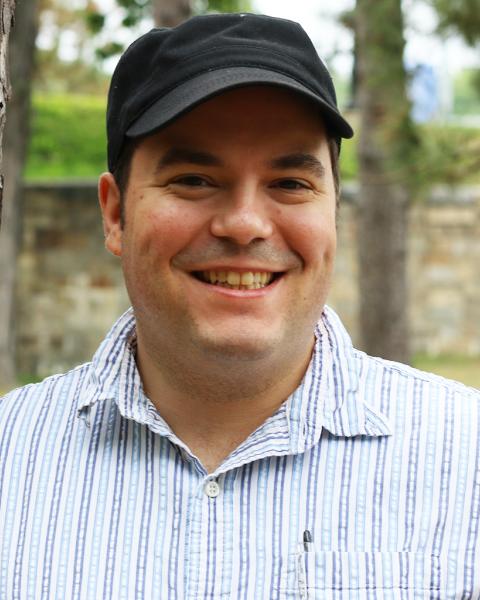Creating New Paths

Note: Inmate names in this story have been changed.
It’s a Friday morning at the Merrimack County Correctional Facility in Boscawen, and in a small classroom, the conversation has turned to the human brain. Specifically, the weight of the brain — a fact that the six male inmates gathered in the room have effortlessly picked up in instructor Chuck Bagley’s weekly class, “Keeping Your Brain in Mind.” The class is part of the county’s Successful Offender Adjustment and Re-Entry (SOAR) program.
“You just learn a lot about the brain,” says David, one of the inmates. “And it’s fun. We can get off topic, but you still learn a lot that way.”
Another man quickly chimes in. “We can purposefully try to get Chuck to talk about something else, and he’ll wind up connecting it back on topic,” he says, as the rest laugh.
“What’s the brain weigh?” someone asks. And then, almost in unison, all six answer, “The brain weighs 3.25 pounds.”
The men laugh together, and then one of them, Steven, gets serious for a moment.
“The teachers really care. When I actually got into SOAR, I didn’t think I’d last a week,” he says. The teachers and his fellow inmates are a safety net, and that support network ultimately leads to success. “When I have a bad day, what we learn here is good material. It’s gonna work, if you work it.”
Positive Changes
SOAR represents a small part of New Hampshire agencies and organizations’ response to the opioid crisis. Most program participants struggle with substance abuse disorders and making it out of jail, and successfully transitioning back into the community, requires a holistic approach. Addiction is a disease that physically changes the brain, and so along with courses on financial literacy and workforce skills, SOAR guides participants through substance abuse recovery, trauma recovery, and other skills that create foundational, positive changes.
While SOAR instructors work with inmates during the 12-week program, Bagley collaborates with jail instructors in five counties to help instructors deepen and refine their own work. A specialist in learning and instructional design, Bagley began working with Merrimack County staff in 2016.
“The instructors come from different disciplines and teaching isn’t their field of study. But that’s good, because they’re really open to new ideas about learning and presenting information,” Bagley says.
Bagley uses a “reflective practice framework” to collaborate with jail instructors. Instead of a top-down, teacher-centered approach, the framework helps instructors develop creative approaches to curricula, reflect on their work through peer discussion, and better understand how they teach — and how their students learn. As Bagley summarizes, “The instructors are the experts — not me.”
“Everything from soup to nuts is on the list of what we cover, from basic things that help the brain function to making a new curriculum for workforce readiness,” he says.
Classes like Exploring Trauma help inmates deal with the root causes of addiction, while Relapse Prevention and Cognitive Behavior Therapy offer lessons in changing the behaviors and patterns that might have brought them to the jail.
"They’re people, just like everybody else. Have they made mistakes? Yeah, but they’re people."
“Their way of thinking is very different from you or me or anybody who hasn’t been to jail,” says Missy Stack, a licensed alcohol and drug counselor and corrections clinician who has worked at the jail for five years. “Every class is based on restructuring that thinking, even the trauma based classes, it’s rethinking how you deal with that. The idea is that for every little factor of life, how you can change your ways of thinking and apply that change?”
The positive effects of applying those changes ripple outward. Programs like SOAR that reduce recidivism rates have a significant economic return. The average cost of incarcerating an inmate in New Hampshire is $34,155 a year, according to the N.H. Department of Corrections. A 2013 study backed by the federal Justice and Education Departments found that inmates who participate in correctional education programs had a 43 percent lower chance of returning to prison than inmates who did not participate. Money saved on incarceration costs can instead be channeled back into other vital programs.
New Approaches
That’s where Stack and other instructors’ work with Bagley comes in. Curricula for the classes are evidence-based and thoroughly tested, but aren’t necessarily designed to capture students’ attention, says Karen Wolivar, administrator of programs and services at the jail.
“Working with Chuck, we’ve developed ways to make this material interesting and make it stick,” she says. “In our class Seeking Safety, part of the curriculum is about teaching coping skills. One of the lessons is six pages of coping skills people can use. But the curriculum says ‘Read through the coping skills with your students.’ OK, that’s going to put everyone to sleep.”
After collaborating with Bagley, the instructors came up with the idea of using a Pictionary-like game to teach the coping skills. Inmates would pull a coping skill from a hat and either start drawing it or acting it out, and the rest of the class would guess the skill.
“A few weeks later, when I’d say, ‘Name a coping skill,’ they were all much quicker to recall,” Wolivar says.”
Stack adds, “Grabbing their attention and keeping it is really hard. Most of these guys didn’t make it through school when they were younger. Many have a variety of mental health issues that have gone untreated until they’ve come here. They don’t always have best attention span or behavior pattern for classroom settings, so we try to keep their attention and relate it to them.”
"Chuck's approach is awesome. I knew I needed a long-term program, and SOAR is great. It’s tough sometimes. But we’re kind of like a family."
According to Bagley, that’s why it’s so important that the instructors drive their own professional development. “It doesn’t happen with me coming in and saying, ‘Do this,’” he says. “We’re able to explore different ideas about how to do this type of work, with the end goal of not seeing the learners again for a while. The thing important to me is that I pop in for a couple hours a week, but these folks are in here every day, and I have an enormous amount of admiration and respect for them.”
Along with collaborating with the instructors, Bagley teaches a class called Keeping Your Brain in Mind. The class explores “the nature of basic brain functionality, essential rules for ensuring healthy, viable brain fitness and strategies for using one’s brain effectively.” Like his work with the instructors, Bagley makes the class a collaborative, contextually-relevant discussion.
“Just about anything they talk about can be guided into the lesson of the day,” he says. “And something as small as sitting in the same type of chair they have makes the discussion that much more cool. They’re people, just like everybody else. Have they made mistakes? Yeah, but they’re people.”
Opening Opportunities
SOAR is an open enrollment program: on any given week, one inmate may be finishing her eighth class while another is starting her first. Classes are scheduled for six hours each day, and it’s not long before the participants form close bonds with each other.
“I’ve learned more from Chuck’s class than any other combination of programs,” David says. “His approach is awesome. I knew I needed a long-term program, and SOAR is great. It’s tough sometimes. But we’re kind of like a family. We talk a lot, help each other out. And you know, we argue like brothers,” he adds, laughing.
That bond helps the inmate get through conflicts and other difficult situations common in jail. Reflecting on her time in SOAR, an inmate named Sarah says the program has helped her change her point of view and her way of thinking. It’s easier now to take a step back and think before acting, she says — and each small victory like that leads to another.
“I want to have a different life than I was living before,” she says. When she leaves the jail, she hopes to go back to school. “I want to go back for some kind of management, so I can get on a different path.”
